Do Words Matter on Stage?
“No word was ever as effective as a rightly timed pause,” Mark Twain liked to say, waxing wordy in his autobiography about “that impressive silence, that eloquent silence, that geometrically progressive silence which often achieves a desired effect where no combination of words howsoever felicitous could accomplish it.”
What would Mark Twain—or Shakespeare (“When words are scarce they are seldom spent in vain”) or Thomas Jefferson (“The most valuable of all talents is that of never using two words when one will do”) make of The Hendrix Project? The show was presented in January at the BRIC theatre in Brooklyn as part of the Under the Radar Festival, and promised to take us to the balcony of the Fillmore East at Jimi Hendrix’s last New Year’s Eve concert, 31 December 1969, nine months before he died. As the show began, the BRIC audience heard the piercingly loud guitar riffs, and watched a dozen Fillmore East concertgoers on the balcony as they looked out, watching Jimi and his Band of Gypsys perform.
I was struck this year by how many works of theatre I saw in January that used words (if they used them at all) in unorthodox ways.
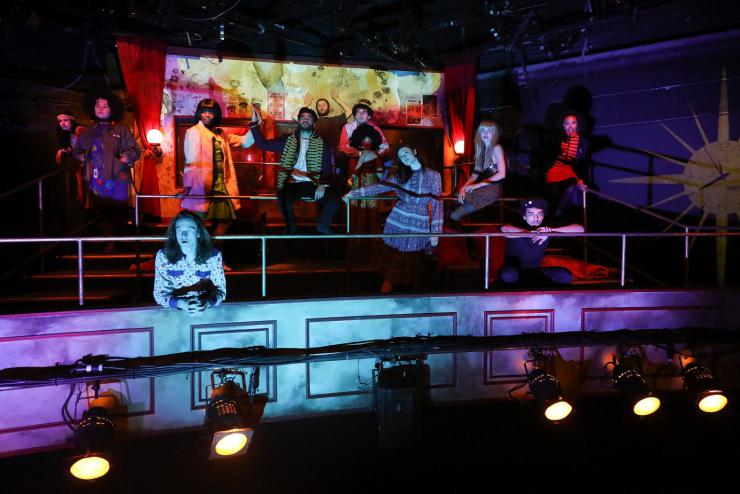
For the first fifteen minutes, as the music continued, the dozen cast members stared silently at us/Jimi, as if transfixed. Then they moved in slow motion. Eventually they loosened up, took drugs, shed some clothes, put them back on, their eyes always fixed on the “stage.” At the end of the hour, none of them had said a single word.
I was disappointed, though I had to admit it made sense: Who would try to talk at a Jimi Hendrix concert? But this was not the only performance I saw in January that left me speechless. January is typically a month when even the most adventurous New York theatregoers brace for the unexpected at the many theatre festivals that coincide with the annual convention of the Association of Performing Arts Presenters. I was struck this year by how many works of theatre I saw in January that used words (if they used them at all) in unorthodox ways.
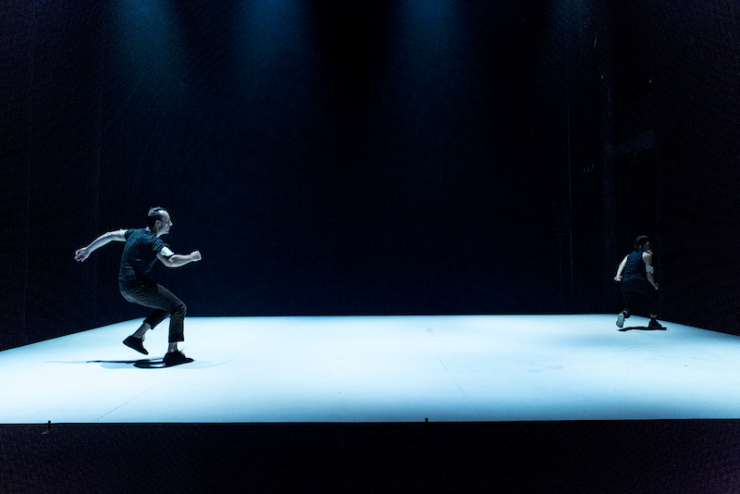
A theatre piece entitled After, which was also part of the Under the Radar Festival, featured very short scenes (few longer than a minute) between a man and a woman (Alicia ayo Ohs and Andrew Schneider), which were separated by abrupt blackouts. It didn’t take long to realize that the blackouts seemed to be the point. This was a visual show created by Schneider, who is probably best known for his trickster, tech-heavy theatre piece from 2016 entitled YOUARENOWHERE. In After, there would be a blackout, and we’d see the man and woman right up close to one another; a blackout, and they’d be at opposite ends of the stage; a blackout, and there’d be a crowd of people milling about. During the scenes in between the blackouts, the performers were definitely talking to one another, but I couldn’t make out anything they were saying. I asked some other audience members, and they couldn’t follow either: “Small talk,” one said. “Gibberish,” said another. I went so far as to request a script—and was told there is no script; the artists don’t work from one.
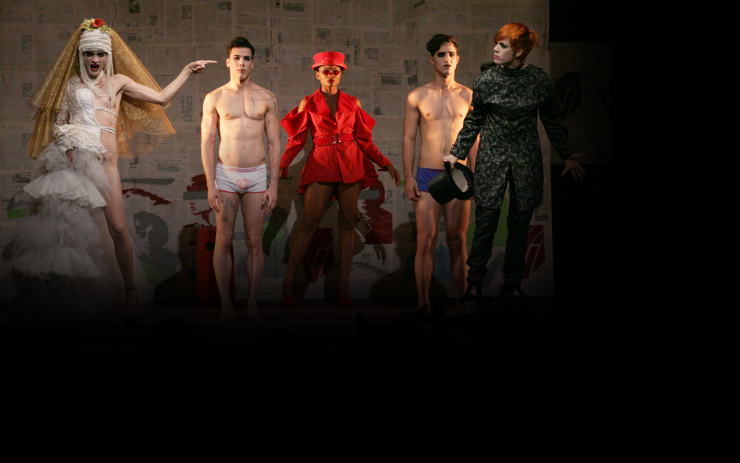
A Havana-based theatre company, Teatro El Público, was definitely performing from a script for their festival play, but its use of language was…complicated. The play, entitled Antigonón, un contingente épico, was performed in Spanish with English subtitles. One can be forgiven for assuming that the play would have something to do with the Sophoclean tragedy of Antigone, but the five members of the cast recited poetic declarations of defiance, with references (largely obscure for a North American audience) to Cuban history and the state of Cuba now.
I’m lying on my deathbed.
They’re taking out my guts, the blood, everything that could be recycled.
This is the country of spare parts…
During the entire eighty minutes, the only passage discernibly connected to Antigone involved a recitation of her name:
Now I’m going to tell you where ANTIGONE is going to touch ANTIGONE is going to touch where it hurts most
ANTIGONE is going to touch where the shit is hard
ANTIGONE is going to touch where the pipe exploded
The absence of a linear narrative in Antigonón was hardly a revolutionary departure for the art form, and the poetry sounded better in Spanish than it read in English. But I confess the production made me uncomfortable. Outside a few colorful costumes, the performers were naked for much of the time, sometimes writhing around each other’s bodies in a kind of erotic ballet, but also nude even when delivering monologues. What they were saying didn’t seem to require that they be naked—there was no obvious connection; words and movement seemed out of sync—and I suspect the effect for most of the audience was to render the words irrelevant.
It would be too easy to see some great cultural meaning in the devaluing of the words on various stages…But for every theatrical piece in January whose wordplay gave me pause, there was one that left me intrigued.
It would be too easy to see some great cultural meaning in the devaluing of the words on various stages. Yes, our technology has reduced our communication to short bursts full of abbreviations and emoticons; and our politics has turned words into lies. But for every theatrical piece in January whose wordplay gave me pause, there was one that left me intrigued. Some of these used more or less the same techniques that I found problematic in the first set of shows.
Wordlessness
Overlord, a performance by the Yu Bing Ensemble at Asia Society, co-presented by the China Shanghai International Arts Festival, was promoted as “music theatre” about a Chinese warlord Xiang Yu, who led rebel forces against the Qin dynasty more than 2,000 years ago.
“Unlike other film and traditional Chinese opera adaptations,” we were told in the program, “Overlord avoids focusing on retelling the story, and instead attempts to find the humanity inside this complex figure. To the untrained theatregoer, Overlord was simply a concert. Musician Yu Bing played the pipa, a traditional Chinese four-stringed lute, accompanied by a dancer, a bass drummer and two other musicians on a mix of Chinese and Western instruments. Not a single word was sung or spoken. Yet the program explained how each wordless song was describing a different chapter in Xiang Yu’s life. My guess is that the audience for such a piece is so well-acquainted with the story of the warlord that it can fill in—much as we might fill in the story of Alice in Wonderland when attending Then She Fell.
Gibberish
Playwright Enda Walsh first gained fame with a two-character play called Disco Pigs, in which a teenage boy and girl who grew up together speak a private language that is Walsh’s imaginative rendition of a dialect from Cork, Ireland, with some neologisms of his own added in. If it was challenging to decipher the exact meaning of the words in the recent twentieth anniversary production of the play at the Irish Rep, Walsh’s prose is full of vivid phrases and energetic rhythm, and the two actors were able to communicate what was going on as much with their gestures and all-around adept physicality as with the words.
Out of Sync
In Pursuit of Happiness, a gunslinger swings open the doors of an old-fashioned Western saloon, and slugs a cowboy, while asking him “What makes you happy?” In the show, which had the briefest of runs at NYU Skirball Center, the Nature Theater of Oklahoma, an inventive downtown theatre troupe, combined forces with a half dozen dancers from EnKnapGroup, a dance company based in Slovenia, to present a hilarious contrast between Wild West Hollywood stereotypes the audience sees and twenty-first century touchy-feely monologues we hear. Words and action are deliberately, cleverly, out of sync. The result is both a parody of Hollywood shoot-em-ups and satire of our generations’ over-intellectualized self-absorption. But, more than just amusing, Pursuit of Happiness also uses the juxtaposition to provide some subtle social commentary.
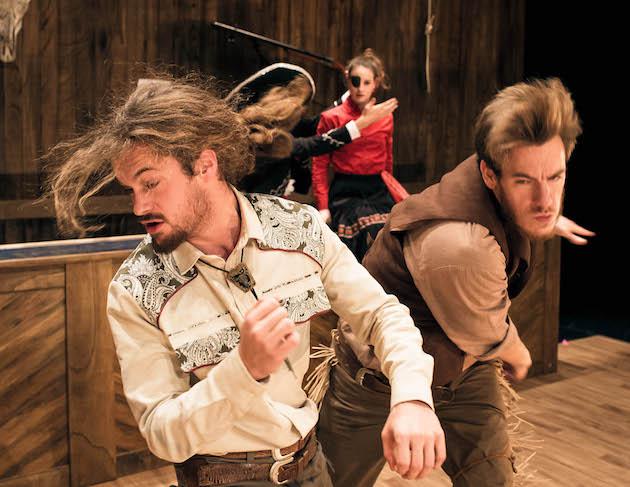
One could, I suppose, call Pursuit of Happiness, dance theatre. The cast, after all, were all professional dancers, making their English-language acting debuts. But if this is dance theatre, that’s not a euphemism for a show that plays down its words. Every word of Pursuit Happiness was projected as subtitles on the back wall, even though everybody was speaking English. The Nature Theater of Oklahoma may like to play around, but they value their words.
Jonathan Mandell’s NewCrit piece usually appears the first Thursday of each month. See his previous pieces here.

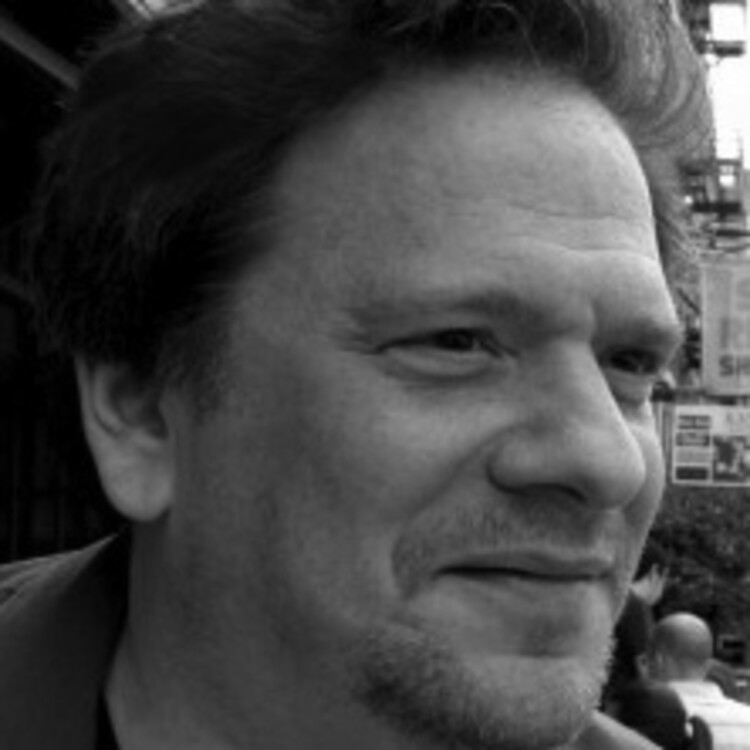
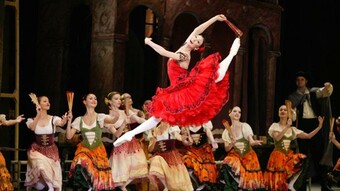

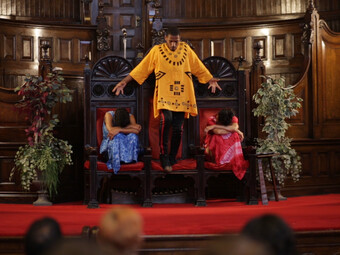

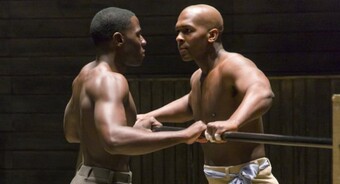

Comments
The article is just the start of the conversation—we want to know what you think about this subject, too! HowlRound is a space for knowledge-sharing, and we welcome spirited, thoughtful, and on-topic dialogue. Find our full comments policy here
I can't help adding in the first paragraph from Jen Gushue's article about Enda Walsh, published yesterday in HowlRound. (No, this wasn't planned; just a coincidence.)
Walsh, Gushue writes:
is jealous of musicians and visual artists because they’re not tied down by words. He bemoans verbosity as a consequence of his form. “As soon as someone starts talking onstage,” he playfully laments, “an audience goes, ‘I must be able to understand this talking thing because I deal with talking every day and it’s a literal thing and it makes sense.’ Well, fuck that,” he continues. “It shouldn’t! It should be a little bit bigger than that and a little bit stranger and a little bit more opaque.”
Or, as I put it, "gibberish."
Hello Jonathan! Thanks for the article. My name is Andrew Schneider. I wrote AFTER. I'm just curious who you asked for a script. We definitely have one. We've always had one. And we've always been working from one. Sorry that we couldn't give you one at the time you requested it.
Hello Andrew. I asked the publicists for the script, twice. The second time, they responded: "So sorry, we checked in with the artists again and there’s nothing we’re able to provide as they don’t work with one. I realize that makes writing a review less than ideal but if there’s another way we’re able to help let me know."
Huh. By the publicists I'm assuming you mean the Public Theater's publicists? Oh man, that's too bad. Wish we could've gotten one to you. I guess I'll contact them and see if I can see why they'd say that. Thanks.
I'd still love to read it. If you're willing, please hunt down my e-mail address here -- https://newyorktheater.me/a... -- and send me a copy.